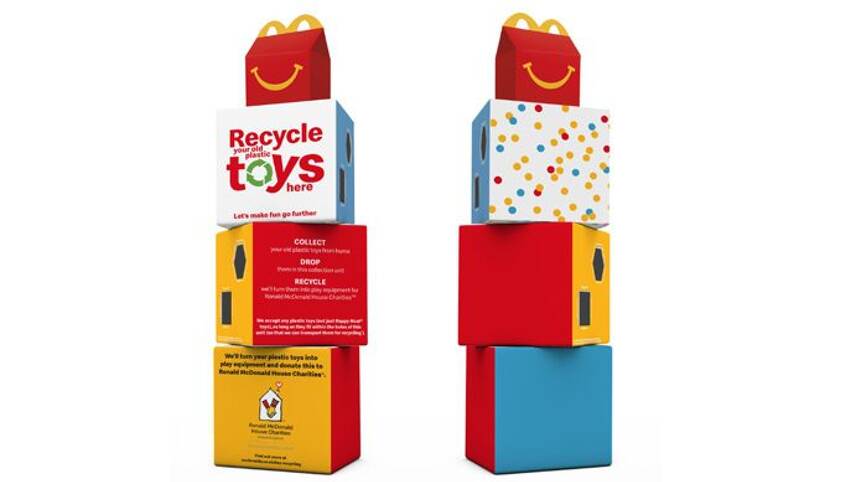Register for free and continue reading
Join our growing army of changemakers and get unlimited access to our premium content

The moves will reduce McDonald's' annual plastics use by 3
In the run-up to the total phase-out – after which point all Happy meals will contain books, paper toys or soft toys – McDonald’s UK&I has announced a series of milestone moves.
From this month, plastic packaging will be removed from Happy Meal toys and replaced with paper-based packaging.
Then, from May, McDonald’s UK&I staff will give customers the choice between a toy or book for every Happy Meal sold.
Also in May, the restaurant will begin a take-back scheme for unwanted plastic toys from its Happy Meals and other brands. The collected toys will be recycled by a third party and used to manufacture play equipment for Ronald McDonald House charities.
McDonald’s claims that once the phase-out is complete, its annual plastics output will be 3,000 metric tonnes less – 200 tonnes of which can be attributed to polybags used to house Happy Meal toys alone.
The restaurant chain has also, for the first time, publicly dubbed the plastics used in its Happy Meal toys and polybags “non-sustainable” – saying it would explore alternatives in other global markets as well as UK&I.
“Globally, McDonald’s is committed to sustainable sourcing and to exploring the production of more sustainable Happy Meal toys that continue to delight customers and families,” McDonald’s global vice president for sustainability Keith Kenny said.
“We are excited to use learnings from these initiatives in the UK and Ireland and other market sustainability programs to inform our global approach.”
Calls to action
The move from McDonald’s UK&I comes after a year-long petition by two young sisters called Ella and Kaitlin, who called for a complete ban on plastic toys with children’s meals.
More than half a million people signed the petition, which was heavily featured on the BBC’s War on Plastic series last year.
At the time of the series airing, McDonald’s UK&I agreed to let customers choose a bag of either melon chunks or apple slices with grapes instead of a toy when buying a Happy Meal.
The new measures, therefore, represent an acceleration of action, in line with McDonald’s wider plan to reduce plastics use and improve packaging recyclability – Better M. Better M launched last November and includes measures to change McFlurry packaging across Europe, in order to mitigate the need for a plastic lid. Plastic-free spoons and updated plastic-free straws are also included in the plan.
In an exclusive interview with edie, Keith Kenny claimed that replacing single-use plastics with other items can lead to “trade-offs” both in terms of environmental footprints and customer preferences. However, he told edie that businesses must respond to consumer demands – including the drive for plastic-free packaging.
Elsewhere in the UK’s fast-food sector, Burger King stopped offering plastic toys with kids’ meals late last year. The chain is notably working to make all of its packaging recyclable, biodegradable or compostable by 2025, after removing plastic straws from all its UK restaurants in 2018.
Sarah George


Please login or Register to leave a comment.